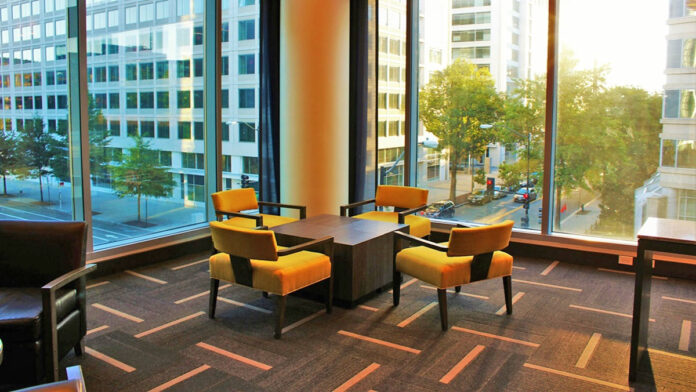Agency
new delhi, Nov 27
Travel has transformed in recent years, and it’s not just because of new destinations or luxury amenities. Travelers now expect more from their hotel stays—they want experiences that blend work, leisure, and local culture. This shift has given rise to a new hospitality model called hybrid hospitality, where hotels offer flexible spaces that cater to guests’ personal and professional needs. Along with this, the trend of workations—where travelers work remotely while enjoying a vacation—has exploded, becoming a key driver in how hotels operate today.
Hybrid hospitality is changing the way hotels function, and it’s not just about making accommodations more comfortable. It’s about creating environments where work and play coexist harmoniously, where you can close a deal in the morning and explore the local culture by afternoon. This evolving model opens up exciting possibilities for both travelers and hotels, offering numerous benefits for all involved.
Hybrid Hospitality: A New Kind of Hotel Experience
Gone are the days when a hotel was simply a place to sleep. Today’s travelers, especially remote workers and digital nomads, are looking for more—whether it’s a quiet place to get some work done, a space to network with other professionals, or a spot to relax and connect with the local culture. Hybrid hospitality answers this call by creating multifunctional spaces that can adapt to various needs.
Hotels adopting this approach provide more than just a room. They offer co-working spaces with high-speed internet, meeting rooms, and ergonomic workstations, ensuring guests can stay productive.
But they don’t stop at work—these hotels also focus on leisure, providing social spaces for relaxation, like rooftop lounges and terraces, and offering curated local experiences that immerse guests in the local environment.
How Hybrid Hospitality Boosts Hotel Revenue
One of the major advantages of hybrid hospitality is its ability to create new revenue streams.
Hotels can monetize more than just their rooms by offering a variety of services that cater to both work and leisure.
Co-Working Spaces: Remote workers are flocking to hotels that provide fully equipped co-working areas. These spaces can be rented out through day passes or memberships and are often bundled with rooms for longer stays. Offering business-friendly amenities like fast Wi-Fi, meeting rooms, and access to food and beverage services keeps these professionals productive during their stay.
Local Experiences: Travelers are hungry for authentic experiences, and hotels can tap into this by offering curated local tours, culinary classes, and wellness programs. By partnering with local businesses, hotels can provide unique, memorable experiences that deepen the guest’s connection to the destination.
These activities not only enrich the guest’s stay but also generate additional revenue.
Open Space Utilization: Many hybrid hotels are transforming underused spaces, like terraces or rooftop gardens, into vibrant community hubs. These areas host events such as social gatherings, creative workshops, or wellness sessions, attracting both guests and locals. These events create a steady stream of income through participation fees, food and drink sales, and partnerships with local vendors.
The Rise of Workations
The concept of workations—where professionals blend work and vacation—is booming, especially in the post-pandemic world. As remote work becomes more common, professionals are no longer tied to an office. They can take their work on the road, leading to longer stays at hotels that offer both work-friendly amenities and vacation vibes.
Hybrid hotels are ideally positioned to cater to this new wave of travelers. With co-working spaces, high-speed internet, and business services readily available, professionals can work efficiently while enjoying a change of scenery. What’s more, workation guests tend to stay longer and spend more on hotel services like dining, wellness programs, and local experiences, making them a valuable demographic for hotels.
Creating Memorable, Authentic Experiences
Beyond providing workspaces, hybrid hospitality also focuses on creating authentic, immersive experiences that allow guests to connect with the destination. Today’s travelers want more than just a comfortable room—they seek opportunities to experience the local culture, food, and traditions.
Hotels that embrace hybrid hospitality partner with local guides, chefs, and artisans to offer exclusive experiences like culinary tours, adventure excursions, and cultural workshops. These activities not only enhance the guest’s stay but also support the local community and help build stronger relationships between the hotel and its surroundings.
Attracting Remote Workers and Digital Nomads
Remote workers and digital nomads represent a fast-growing segment of travelers who are looking for flexible accommodations that allow them to be productive while enjoying their time away. Hybrid hotels offer the perfect solution, with dedicated workspaces, reliable internet, and extended-stay options. These travelers often book longer stays, leading to increased occupancy and more consistent revenue.
What’s more, remote workers are likely to spend on other services such as dining, wellness programs, or local experiences during their stay, making them a highly profitable guest segment for hotels. With the right amenities in place, hotels can attract and retain these valuable customers, creating a reliable source of income.
Conclusion: Hybrid Hospitality is the Future of Travel
The travel landscape has changed, and hybrid hospitality is the answer to the evolving needs of today’s travelers. By offering flexible spaces that blend work, relaxation, and local culture, hotels can create unique experiences that cater to both professional and personal needs.
This model increases guest satisfaction and opens up new revenue streams for hotels. Whether through co-working spaces, local partnerships, or community-driven events, hybrid hospitality helps hotels stay relevant in a competitive market.
As more people embrace workations and the ability to work remotely, the demand for hybrid hospitality will only grow. Hotels that adapt to this new model will not only attract today’s travelers but also help shape the future of the hospitality industry, where work and leisure come together in perfect harmony.



























